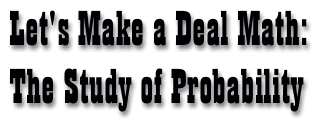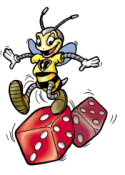

 |
 |
Linda D. Resch
|
|
|
|
|
|
|
Introduction "Heads, you go first; tails, I do." "I need to roll a seven to win." "If I can spin and land on a green slot the jackpot is mine." How many times have you played a game and hoped to win? What is the probability of winning? The purpose of this WebQuest is to introduce you to some interesting problems and learn about probable outcomes. At the conclusion of the WebQuest you will be able to explain why some choices are better than others.
Benchmarks:
Grade 6
Strand 8: Data Analysis and Probability
SLC 24: Make predictions of outcomes of experiments based upon theoretical probabilitities and explain actual outcomes.
Grades 7&8
Strand 4: Data Analysis and Probability
SLC 14: Represent and interpret the possible outcomes for a mathematical situation and calculate probabilities.
Your task is to solve and analyze several problems about probability. After you have completed this task and understand how probability works, design a game or activity that will show others what you have learned. Your final project will include:
- A tally sheet showing the results of coin flipping
- A graph showing the amount of each color found in a bag of M&M's candy plus the percentage of each color
- A printed copy showing your results while playing one of the Monty Hall simulation games
- An explanation about whether or not you should switch your door selection during the Monty Hall game
- A probability game
- Answers to the Skill Level and Concept Level questions
Skill Level
- What is the definition of probability?
- When did the study of probability begin?
Concept Level
- Why is it important to understand probability?
- How do meteorologists use probability?
Application Level
- Design a game that demonstrates your understanding of probability.
1. Predict how many times a coin will land heads up or tails up when flipped 50 times. Flip a coin 50 times. Tally the heads and tails in the spreadsheet provided. How close was your prediction? Compare your results with those of your classmates.
2. Go to the M&M's: In the Bag Graphing Activity and complete the assignment.
3. "Would you make a deal to trade up to five hundred dollars in cash for one of these three doors, knowing behind one of them is $3,254 in cash or valuable merchandise? Several people may have to make that decision during the next few minutes as we bring you the Marketplace of America.... Let's Make a Deal! And now, here's America's top trader, TV's Big Dealer, Monty Hall! - Opening Spiel 1963-1969
The well known Monty Hall probability problem is based on a television show of the 1960's and 1970's called Let's Make a Deal. Show host, Monty Hall would ask a contestant to pick one of three doors. Behind one of the three doors was a large prize. Behind the other two doors were lesser prizes, sometimes a group of goats grazing on fresh hay. Once the contestant picked a door, Monty would open one of the remaining two doors that did not have a prize. Then, he would offer the contestant a chance to switch doors.
Try one of the Monty Hall simulation games listed in the resources section. Before playing, predict whether or not it is better to switch door selections after one is revealed. Tally your results either on the Web or on the Monty Hall Tally Table. What happened? Compare your results with those of your classmates.
4. Design a game of probability using either a spinner or dice. Be sure to include the following elements:
- Title of your game
- Game components
- Directions so others can play
- List of rules
- Explanation of why your game is fair
5. Prepare to share your findings and game with the class.
Resources
Evaluation
Probability Evaluation Rubric 4 Clear evidence of understanding probability. The game design and directions exhbit knowledge of probability. All elements of game design and directions are covered. 3 Adequate evidence of understanding probability. The game design and directions indicate understanding of probability. 2 Some evidence of understanding probability. The game design and directions show some understanding of probability. 1 Little evidence of understanding probability is shown in the game design or directions. You learned how to determine the probability of events and tackled the difficult Monty Hall problem that adults have debated. You even had fun making your own game. Hopefully, you have learned the importance of understanding probability and the role it plays in everyday life. You might also like to try the Birthday Problem. How likely is it that two people in your class have the same birthday?
Updated March 12, 2015
![]()